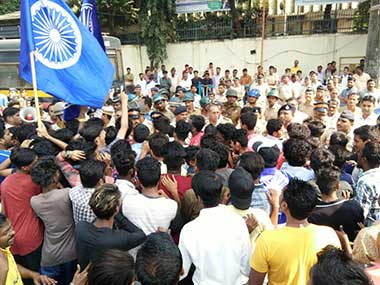The first anniversary of the caste riots in Bhima Koregaon, which rocked Maharashtra’s politics, is in less than two months. As many developments have taken place since the time of the incident, here’s an overview of the entire case: What happened on 1 January, 2018? On 31 December, 2017, a conference called Elgar Parishad was held at Shaniwar Wada near Pune to mark the 200th anniversary of the Battle of Koregaon-Bhima . The disturbances erupted in the village of Koregaon-Bhima on 1 January during the 200th anniversary celebrations of the Anglo-Maratha War of 1 January, 1818, between the army of Peshwa Bajirao II and a small force of the East India Company that comprised a large number of Dalits. [caption id=“attachment_4498523” align=“alignleft” width=“380”]  File image of protests in relation to the Bhima-Koregaon violence. Image courtesy: 101Reporters[/caption] Several lakhs of Dalits had congregated around the Victory Pillar (Vijay Stambh) erected by the British in Sanaswadi village when suddenly stone pelting started, allegedly by some right-wing groups carrying saffron flags. In the ensuing clashes, more than 30 vehicles, including buses, police vans and private vehicles, were torched or damaged. The police fired tear gas shells to control the rampaging mobs and prohibitory orders were imposed in the entire district. One person lost his life in the caste violence, which led to the statewide Dalit agitation. Events that followed the violence The violence prompted Bharipa Bahujan Mahasangh, a party headed by Prakash Ambedkar — the grandson of BR Ambedkar, to call for a ‘peaceful Maharashtra shutdown’ on 2 January. However, angry Dalits protesters staged rail, road blockades and took out processions in Mumbai and agitations in different parts of Maharashtra. Moving swiftly amidst rising Dalit furore, the Pimpri police lodged a complaint against Shivjagar Pratisthan president Sambhaji Bhide Guruji and Hindu Janjagruti Samiti chief Milind Ekbote . Subsequently, Chief Minister Devendra Fadnavis announced a judicial probe by a sitting High Court judge and a CID investigation into Monday’s violence in Koregaon-Bhima. On 28 August, the Pune Police conducted multi-city raids as part of a probe into the Elgar Parishad conclave. Five activists — Sudha Bharadwaj, Gautam Navlakha, Vernon Gonsalves, Arun Ferreira and Varavara Rao — were arrested during the raids, triggering a massive outcry. After the Pune Police analysed the “highly incriminating evidences” seized from the five arrested persons, it claimed that it has unearthed a “Maoist conspiracy hatched to overthrow the elected government” besides targeting top officials and political leaders. The Supreme Court directed that the five activists should be kept under house arrest, while hearing a plea by well-known historian Romila Thapar as well as Devika Jain, Prabhat Patnaik, Satish Deshpande and Maja Dharuwala challenging the arrests. Meanwhile, an RTI query revealed that the Devendra Fadnavis government dropped at least three cases against Bhide after coming to power in 2014. However, Pune SP Sandeep Patil told ANI that the charges against Bhide and others in Bhima Koregaon violence case were still in place. What are people saying? Following the August arrests, several activists and Opposition leaders criticised the Narendra Modi-led government, and accused it of intimidating voices of dissent. At a press conference, human rights activist Aruna Roy, literary figure Arundhati Roy and lawyer Prashant Bhushan came together along with other activists on 30 August. “All norms of the Constitution are being violated. Right to freedom of expression is at stake. The arrest of the five is an indication that any voice raised in support of Dalits or poor will be silenced in this country,” said activist Aruna Roy while addressing the media. In a joint statement, the activists stated that “targeting the democratic rights activists is an attack on the poor and marginalised sections of the society on whose behalf these activists have been raising their voices.” The activists also slammed the term “urban Naxals” used for the dissent saying that it is the government’s desperate attempt to portray those as Maoists who stand up for demanding justice for the Dalits or the marginalised sections. Congress has repeatedly targetted the BJP over the violence and the activists’ arrests. On the other hand, the BJP has accused Congress of supporting Maoists.
There is only one place for idiocy and it's called the Congress. Support ‘Bharat Ke Tukde Tukde Gang’, Maoists, fake activists and corrupt elements. Defame all those who are honest and working.
— Amit Shah (@AmitShah) September 28, 2018
Welcome to Rahul Gandhi’s Congress. #BhimaKoregaon https://t.co/eWoeT0qo1L
Amid all this, Pune Police has also drawn heavy criticism for not arresting Bhide and Ekbote.
Maharashtra govt has withdrawn rioting cases against Rightwing activist Sambhaji Bhide for #BhimaKoregaon violence while framing fake charges against Human Rights Activists.
— CPI (M) (@cpimspeak) October 2, 2018
CPIM demands those responsible for anti-dalit violence be brought to book and cannot be exonerated. pic.twitter.com/WrrH65BBNF
After the Supreme Court refused to interfere with the arrest of the five activists and declined to appoint a Special Investigation Team (SIT) to probe their arrest, the Congress hoped that the police will conduct investigations as per the law . “We hope that any person who is found in any clandestine activity against the Indian state would be dealt with sternly in accordance with the law rather than according to the whims and fancies of (BJP chief) Amit Shah who has already seen the writing on the wall in the five election-bound states,” he told reporters. With inputs from agencies


)

)
)
)
)
)
)
)
)



